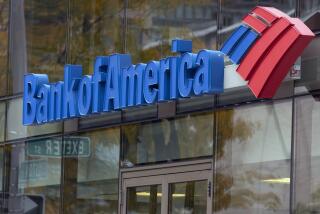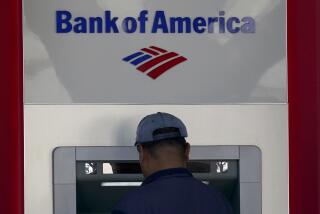Bank’s Hold Policy Held Up Longtime Customer’s Plans--but It’s Perfectly Legal
- Share via
Q. Last month my mother sent me a check for $10,000 drawn on a savings and loan in San Francisco. I deposited it Feb. 23 in my Bank of America checking account in Los Angeles, where I have maintained an account for nearly 20 years without a problem. I used an ATM to make the deposit.
Several days later, the bank sent me a notice informing me that a five-working-day hold had been placed on $4,800 of the deposit and an 11-working-day hold had been clamped on $5,000 of it, leaving me with immediate use of just $200. As it happened, that money was intended for a real estate deal I was involved in and the bank’s actions meant I couldn’t get my money and close the deal until 2 1/2 weeks after the check was deposited.
I can’t believe that “real” businesses operate this way. Does Donald Trump have to wait 11 working days when he moves money between bank accounts? What does he know that I don’t?
--C.M.L.
*
A. For starters, let’s say straight away that the Bank of America’s actions were well within their own policies, which, in turn, follow the terms of the federal law known as the Expedited Funds Availability Act. (Interesting choice of a name given the circumstances, don’t you think?)
The law permits banks to hold deposits up to 11 working days under the following circumstances: if your account has been open 30 days or fewer, if the bank believes the check being deposited won’t be paid, if you deposit checks totaling more than $5,000 on a single day, if the check in question has already been returned once for insufficient funds, if you have repeatedly overdrawn your account in the last six months, or if there is a computer or communications equipment failure affecting the deposit. Bank of America says its policy is to notify customers promptly if it places a hold on a deposited check.
The bank is also permitted to place a hold on deposits for up to five days if it has reason to be concerned that the check might not clear. How large a deposit will trigger the Bank of America’s “standard” five-day hold? That depends on your normal banking activity, a bank spokesman says. If the check in question is “significantly larger” than your normal deposits, it could be subject to a hold. As you can see, and assuming that your normal deposits are not in the $5,000-to-$10,000 range, your case was handled according to bank procedures and laws.
What does Donald Trump do? Frankly, we don’t know for sure, but you can bet he doesn’t wait much more than a few minutes for much of anything.
The most common practice among businesses and others wanting immediate use of transferred funds is to have them “sent” electronically, directly from one account to another.
This practice, dating from the pre-computer age and known as a “wire transfer,” simultaneously debits the payor’s account and credits the recipient’s. And because the process involves a determination that the payee’s account has sufficient funds to cover the transfer, the most important reason for the hold is eliminated. The recipient’s bank is at no risk in this transfer. The Bank of America charges $30 for wire transfers to other banks and $7 for interbank transfers.
You can also use a cashier’s check, although the Bank of America spokesman said even these are subject to holds of up to nine business days in cases involving checks for more than $5,000, in large part because of increasing numbers of counterfeit cashier’s checks. Bank of America charges up to $6 for a cashier’s check.
Bank drafts are usually less expensive than cashier’s checks, but they still require the payor’s bank to certify that the funds exist in the account before the check is issued, and certified checks for more than $5,000 are also subject to nine-day holds.
According to a Bank of America spokesman, the most effective way to avoid or reduce the effect of these policies is to deposit the check in person at your bank and to talk face-to-face with the bank manager about your need for immediate use of your funds. In most cases, the spokesman said, a customer with an unblemished record at the bank will be accommodated.
To reach Carla Lazzareschi, write to Money Talk, Business Section, Los Angeles Times, Times Mirror Square, Los Angeles, CA 90053 Or send e-mail to carla. lazzareschi@latimes.com
More to Read
Inside the business of entertainment
The Wide Shot brings you news, analysis and insights on everything from streaming wars to production — and what it all means for the future.
You may occasionally receive promotional content from the Los Angeles Times.










